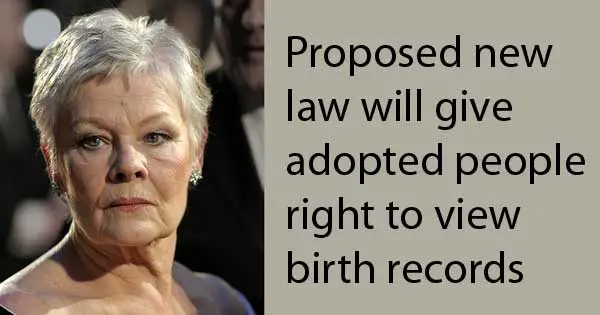People who were adopted in Ireland will be allowed access to their birth records for the first time in history, if a proposed new law gets passed.
For decades, thousands of adopted people have struggled to find out their true identity because Irish law blocked their right to view their birth records.

The issue was highlighted in the 2013 film Philomena, a true story in which Judi Dench’s character was searching for her son that had been taken from her and given up for adoption. The emotional story revealed that once grown up her son had tried to track her down, only for his search to be blocked by the Irish law. By the time Philomena managed to trace her son, he had already passed away.
Despite various campaigns to have the rule changed, the Supreme Court upheld that ruling in 1998, on the grounds that allowing access to the birth records would be a violation of the mother’s privacy.
The law has proved a major stumbling block for thousands of people wishing to research their family history.
However, Minister for Children and Youth Affairs Dr James Reilly thinks it is time for it to be changed. Early this week, he presented his draft of the Adoption (Information and Tracing) Bill to a Dublin press conference. He said: “It’s all too easy for those of us who know where we come from not to appreciate the profound importance of this information.
“The Bill will give an adopted person aged 18 years or over, who was adopted prior to commencement of the Bill, a statutory entitlement to the information required to apply for his or her birth certificate, following a request to the Tusla (the Child and Family Agency).”
The change would entitle adopted people the right to see their birth certificates, often a major step in discovering true identity and bloodlines. There is also the need for people to know about their family medical history, and what they could be likely to face in their future.
However, access would only be granted if the birth-mother gave consent. In cases, where the mother refuses to allow access to the birth records, the adopted person can still view them if they sign statutory declaration not to contact their birth parent.
The change has been welcomed by many, as it sees Irish law move alongside international rulings regarding adopted people’s rights to their birth records.
However, the actual benefits of the access has been questioned by some groups. In some cases, birth certificates can be misleading with incorrect names for a child’s mother and no information for his/her father.
This issue often occurred when babies were taken by Catholic institutions in the 1940s, 50s and 60s because they had been born outside wedlock and the mother was considered too young to cope.
The new law could be in place as soon as early next year, if it is rushed through ahead of the general election.